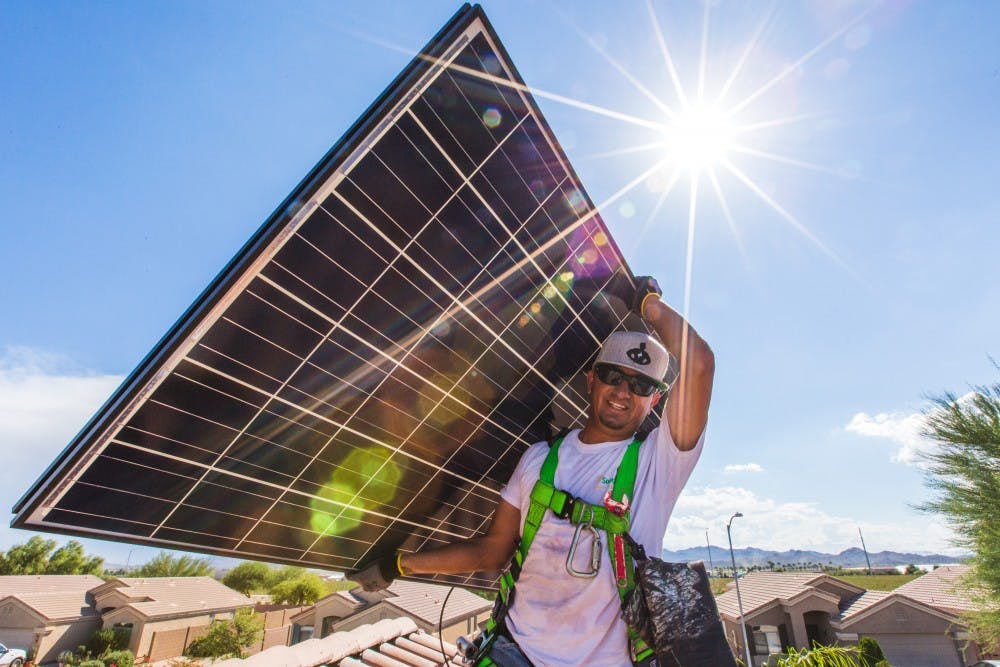Electric car manufacturer Tesla and solar company SolarCity have reinvented the solar panel, eschewing traditional aesthetics in favor of something best described as suburban camouflage.
The technology is not new, but the implementation is turning some heads.
"It's something that's been around in various formats for a while," Stuart Bowden, a senior sustainability scientist at ASU, noted. "The challenge is how to do it in a way that is cost effective and reliable."
In reality, the gap between the new shingle style panels touted by Elon Musk's tech organs and the traditional breed is pretty narrow. It's the same technology, albeit wrapped up with a heavy dose of rustic charm. The panels come in four flavors, each almost indistinguishable from the rooftops of the average neighborhood.
"It's the same basic principle, the idea of putting cells into a rooftop, they use the existing crystalline silicon solar cells," Bowden said. "Many companies have tried it, but no one's been able to get the complete product together."
Bowden said the ASU School of Sustainability had a summer program where students toyed with the appearance of panels in a fashion similar to SolarCity's new project. Again, Bowden asserts that the technology aspect is not the challenge.
"It comes down to 'Can you get the architects on board?' and 'Do the architects really like it?'," Bowden said.
That said, Solar City has had a rocky road to rollout.
"Arizona's a particularly tricky state for us," said Suzanne Merkelson, the deputy director of public affairs at Solar City.
This is in part due to SolarCity's fluctuating relationship with the Arizona Corporation Commission, Arizona's regulatory body for all its utilities and pipelines.
"What my team does is work with the commission and try to make sure that the commission passes policies that are amenable to solar and to making solar economic for people who want to go solar," Merkelson said.
Part of what makes solar an economical option is something called "net metering," which allows those who have purchased rooftop solar panels to sell their excess energy back to the grid at wholesale prices. Recently, net metering has become a point of contention between solar companies and regulated utility companies.
Arizona Corporation Commission attorney Eric Hill quit his job in 2016 so that he could represent solar companies during their battle over net metering with the Arizona Public Services Company. As of right now, the value of rooftop solar power is very much up in the air.
“The Commission is currently trying to determine the full benefits and costs of rooftop solar," Merkelson said. "We hope that all of these benefits, including improved public health from lack of emissions and money savings from not needing to build more transmission infrastructure, are accounted for.”
Trying to gain the support of the corporation commissioners, though, has proved challenging. Solar companies are not the only ones vying for the attention of the commission.
In the 2014 election, $3.2 million was spent by two independent expenditure groups suspected to be backed by APS in support of commissioners Tom Forese and Doug Little. APS hasn't confirmed or denied the accusation.
"A lot of folks in the state find it problematic because the ACC is meant to regulate the utilities but then the utilities are helping to pay for some of these people to get elected."
Angie Holdsworth, the Arizona Corporation Commission spokeswoman, assured that the ACC is neutral.
"Basically (the commission) is trying to reevaluate what the value and the cost for solar should be," she said. "That's where you're going to get these recommendations for all these methodologies."
Despite any difficulties arising from APS and Corp Comm, Merkelson remains optimistic.
"Arizona is one of the top states for solar, obviously it's the sunniest state in the country, and we anticipate to provide solar for the people of Arizona as long as they keep wanting it," she said.
Correction: Due to a source error, a previous version of this article misrepresented the nature of the relationship between APS, the Arizona Corporation Commission and Solar City, and how that relationship impacts the value of solar. The error has been corrected.
Reach the reporter at sdeadric@asu.edu or follow @deadrick_sam on Twitter.
Like The State Press on Facebook and follow @statepress on Twitter.




